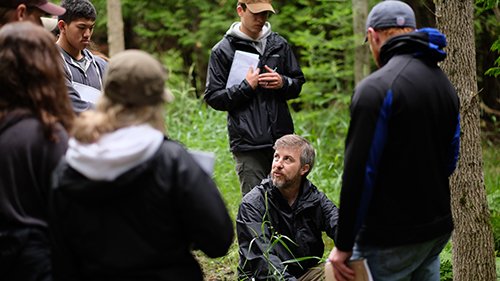Summer Classes
The CMU Biological Station offers a unique opportunity to immerse yourself in hands-on, field-based learning. Whether you're pursuing a degree in biology or simply passionate about the natural world, our diverse range of classes allows you to explore a variety of disciplines. These courses provide invaluable experiences that connect classroom knowledge with real-world applications. Browse our course offerings and register below to take part in this exciting educational adventure!

Classes available at the CMU Biological Station - Summer 2026
* Classes and schedule subject to change.
** Listed in order of course dates
HON 321AZ - Sculpture, Collage and the Natural Environment
- 3 credits
- May 10-16, 2026
- Taught by Lavana Shurtliff
HON 321CZ - Community Service on Beaver Island
- 3 credits
- May 10-16, 2026
- Taught by Mark Francek
Hon 321DZ - The Murder of King James Jesse Strang
- 3 credits
- May 10-16, 2026
- Taught by James Hill
BIO 516Z - Avian Field Experience
- 2 credits
- May 18-22, 2026
- Taught by Nancy Seefelt
- Also available as a workshop
BIO 213Z - Foundations of Ecology
- 4 credits
- June 15-July 3, 2026
- Taught by Scott McNaught
BIO 530Z - Stream and River Ecology
- 3 credits
- June 22-27, 2026
- Taught by Gary Lambert and Tiffany Schriever
- Also available as a workshop
BIO 520Z - Great Lakes Mollusks
- 2 credits
- July 6-10, 2026
- Taught by Dave Zanatta
- Also available as a workshop
GAM 213Z - Games in Isolation
- 3 credits
- July 5-12, 2026
- Taught by Anja Mueller and Tracy Davis
- Also available as a workshop
BIO 100Z - Introduction to Field Biology at Beaver Island (open to high school students)
- 3 credits
- July 13-18, 2026
- Taught by Dr. Peter Kourtev
ART 397AZ - Nature Inspired Art
- 2 credits
- August 3-8, 2026
- Taught by Denise Fanning
- Also available as a workshop
ENG 513AZ - Creative Writing in Nature
- 2 credits
- August 3-8, 2026
- Taught by Robert Fanning
- Also available as a workshop